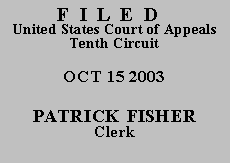

| HAROLD LOYD JOHNSON,
v.
RON WARD |
No. 02-6156
(D.C. No. 97-CV-1740-F) |
During the weekend of August 12-14, 1994, Mr. Johnson drank beer continuously from Friday evening until Sunday, stopping only to sleep. Early Sunday morning, he got into an argument with Jesse Davis, an acquaintance of his. Mr. Johnson shot Mr. Davis twice in the chest. After Mr. Davis fell to the ground, Mr. Johnson stood over him and shot him three more times in the back. When his gun was empty, Mr. Johnson pistol-whipped Mr. Davis with the gun. Mr. Davis died shortly thereafter.
At trial, Mr. Johnson testified he had been so intoxicated during the evening that he had blacked out. He asked the court to give the jury a series of instructions explaining that they were obligated to find him not guilty if they had reasonable doubt he could form the specific intent to commit murder. The court instructed regarding intent but concluded Mr. Johnson had failed to present sufficient evidence to warrant an instruction on the defense of voluntary intoxication under Oklahoma law because he could recall many of the evening's events "with particularity and specificity." Aplt. App. at 131. The Oklahoma Court of Criminal Appeals ("OCCA") affirmed, noting Mr. Johnson "recalled everything that happened that evening but the actual shooting, at which time he claims to have blacked out." Id. at 13. The jury convicted Mr. Johnson, and he was sentenced to life imprisonment without parole. This habeas corpus petition followed.
Under the Antiterrorism and Effective Death Penalty Act of 1996 ("AEDPA"), if a claim is adjudicated on the merits in state court, a petitioner is entitled to federal habeas relief only if he can establish that the state court decision "was contrary to, or involved an unreasonable application of, clearly established Federal law, as determined by the Supreme Court of the United States," or "was based on an unreasonable determination of the facts in light of the evidence presented in the State court proceeding." 28 U.S.C. § 2254(d)(1), (2). The AEDPA also requires federal courts to presume state court factual findings are correct and places the burden on the petitioner to rebut that presumption by clear and convincing evidence. 28 U.S.C. § 2254(e)(1).
Mr. Johnson relies on Beck v. Alabama, 447 U.S. 625 (1980), in which the Supreme Court mandated lesser-included offense instructions in capital cases where supported by the evidence. The Court specifically stated, however, that "[w]e need not and do not decide whether the Due Process Clause would require the giving of such instructions in a noncapital case." Id. at 638 n.14. This circuit has since held that "a petitioner in a non-capital case is not entitled to habeas relief for the failure to give a lesser-included offense instruction, 'even if in our view there was sufficient evidence to warrant the giving of an instruction on a lesser included offense.'" Lujan v. Tansy, 2 F.3d 1031, 1036 (10th Cir. 1993) (quoting Chavez v. Kerby, 848 F.2d 1101, 1103 (10th Cir. 1988)).
"On federal habeas review, we review the alleged error in failing to instruct on voluntary intoxication in the context of the entire trial, only for the denial of fundamental fairness and due process." Spears v. Mullin, 343 F.3d 1215, 1244 (10th Cir. 2003). As a petitioner attacking a state court judgment based on a refusal to give a requested jury instruction, the burden on Mr. Johnson is especially great. Tyler v. Nelson, 163 F.3d 1222, 1227 (10th Cir. 1999). This is because "[a]n omission, or an incomplete instruction, is less likely to be prejudicial than a misstatement of the law." Id. (internal quotations omitted) (quoting Henderson v. Kibbe, 431 U.S. 145, 155 (1977)).(1)
Under Oklahoma law, a trial judge first has a duty to decide whether the voluntary intoxication defense is sufficiently raised to warrant an instruction. Jackson v. State, 964 P.2d 875, 892 n.5 (Okla. Crim. App. 1998). The defense of voluntary intoxication requires that a defendant, "first, be intoxicated and, second, be so utterly intoxicated, that his mental powers are overcome, rendering it impossible for a defendant to form the specific criminal intent or special mental element of the crime." Id.; see also Frederick v. State, 37 P.3d 908, 942 (Okla. Crim. App. 2001) (holding mere consumption of alcohol and marijuana insufficient to raise defense without showing consumption prevented defendant from forming intent); Bland v. State, 4 P.3d 702, 718 (Okla. Crim. App. 2000) (upholding refusal to give instruction because defendant gave detailed account of crime's circumstances).
Applying these standards, the OCCA found that Mr. Johnson failed to present sufficient evidence to warrant an instruction on the defense of voluntary intoxication. On this record, in light of the high standards imposed by AEDPA, we conclude that the failure to give a voluntary intoxication instruction did not render Mr. Johnson's trial fundamentally unfair.(2)
For the foregoing reasons, we AFFIRM.
ENTERED FOR THE COURT
Stephanie K. Seymour
Circuit Judge
1.Mr. Johnson also contends the failure to give an instruction on an element of the crime is structural error. The district court correctly held that such an error would constitute trial error only, subject to the harmless error rule. See Aplt. App. 47-48.
2.We need not address Mr. Johnson's exhaustion argument because it is proper to consider an unexhausted claim on the merits for the purpose of denying relief. 28 U.S.C. § 2254(b)(2).